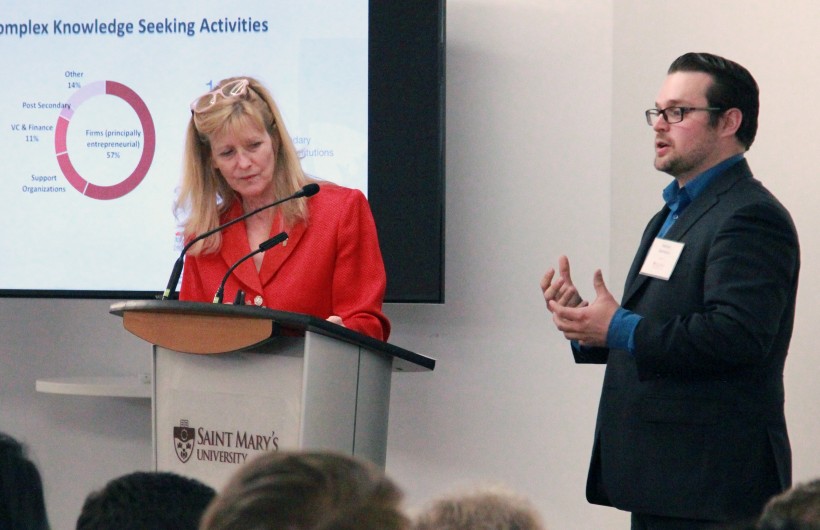A new report from St. Mary’s University Professor Ellen Farrell highlights the interconnectedness of the Atlantic startup ecosystem, but also reveals it lacks ties with organizations outside the region.
The report titled “Atlantic Entrepreneurial Ecosystem: Vibrant and Globally Aspiring” was released at the Halifax tech incubator Volta on Friday. Farrell presented her work with the help of collaborator Nathan Dennison of Nova Scotia Business Inc.
The 70-page document is the result of three years of research and tracks the relationships between members of the innovation community, including universities, venture capital funds and startups, among others.
“Relations are important,” said Farrell in introducing the report. “They’re important because entrepreneurship doesn’t exist in the air and opportunities don’t appear out of nowhere.”
The researchers modelled connections between respondents based on “knowledge-seeking activities”—the process by which entrepreneurs and innovators seek information or advice from each other.
Farrell and her colleagues surveyed 1,666 organizations, and the report features almost 3,500 data points.
Ashored, a SMU TMEI Grad, Is Accepted into MassChallenge.
The standing-room only presentation doubled as the keynote for an event held to mark the beginning of a new collaboration between SMU and Volta.
The Volta space on the main floor of the Maritime Centre now boasts a dedicated area for the use of SMU students, which is designed to foster a co-operative work environment and give students access to the Volta ecosystem.
"This partnership will infuse Volta's community with the creativity, enthusiasm and innovative thinking that SMU students exemplify," said Volta CEO Jesse Rodgers in a press release.
The incubator also has plans to add a coffee shop in the near future to further encourage networking.
According to Farrell’s research, startups and their supporting organizations in Atlantic Canada tend to have strong ties within the region, with a high degree of cross-communication.
However, the majority of the knowledge-seeking behaviors documented in the report involve business and finance questions, as opposed to product-development advice. Companies were actively seeking generalized entrepreneurship guidance more often than feedback relating to their specific products.
The report warned that this type of insight is useful, but will not drive technological advancement. “Outreach designed to spur innovation will need curiosity aimed at the more technical/product/design investigations to create new technologies and product solutions,” said the report.
A second issue flagged by the report is Atlantic Canada’s lack of entrepreneurial integration with the rest of the world.
About three-quarters of organizations involved in interactions with Atlantic Canadian startups were themselves located in Atlantic Canada. The next largest sources of connections were the rest of Canada, the United States and other countries, in that order.
Global networks are a consistent feature of successful startup environments, and according to Farrell’s data, Atlantic Canada curently lacks this high level of international connectedness.
“Atlantic Canada has to promote ourselves,” she said. “We have to promote ourselves as being an active and motivated ecosystem.”
The report also includes a list of 22 steps that established businesses can take to assist startups.
Examples include participating in prototype testing and providing feedback on the market-fit of new products.










